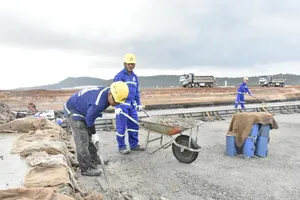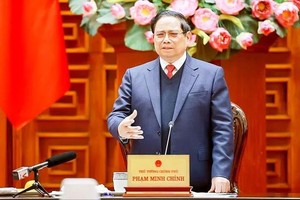
The Ministry of Construction has recently published a report concerning the real estate market for the third quarter, indicating that apartment prices in both Hanoi and Ho Chi Minh City have continued to rise. This trend suggests that the market remains unregulated despite numerous attempts by various ministries, agencies, and local authorities.
Reporters from SGGP had an interview with Deputy Director Vuong Duy Dung of the Department of Housing and Real Estate Market Management at the Ministry of Construction to discuss this matter.
Through a comprehensive synthesis and analysis, it is evident that supply constitutes merely one of the factors contributing to the rise in real estate prices. The escalation in prices can also be attributed to a multitude of other influences.
Notably, two emerging factors include the rising costs associated with land and the effects of newly implemented calculation methods and land price tables, as well as economic fluctuations linked to the stock market, bonds, and gold, which are prompting a shift in cash flow from individuals and investors towards real estate.
Presently, the issue of escalating land-related costs poses a significant challenge for investors. It is apparent that the management and execution of land use rights auctions in certain regions and localities have been sub-optimal in the past. This situation adversely affects price levels, resulting in increased expenses for housing project implementation; thereby creating difficulties for businesses and leading to various negative repercussions in the market.
The Ministry of Construction has recently put forth a series of new proposals to the Government, which are anticipated to serve as effective measures for market regulation.
Specifically, the Ministry has suggested a review and enhancement of regulations concerning land use rights auctions, aimed at increasing deposits, establishing starting land prices that more accurately reflect the actual conditions of the area, reducing the time frame for payment of auction winnings, and restricting participation in auctions to prevent speculative activities.
Furthermore, the deputy minister believed that relevant authorities should explore and implement tax policies targeting individuals who own multiple properties and parcels of land, in order to curtail speculation and the rapid buying and selling of real estate for profit, while ensuring alignment with Vietnam's socio-economic context and international standards.
The Ministry of Construction recommended that the government swiftly implement solutions and measures to mitigate the adverse effects of the land price lists mandated by the 2024 Land Law on land prices, housing costs, and the overall real estate market. Furthermore, relevant authorities are exploring the feasibility of a pilot model ‘Real Estate Transaction and Land Use Rights Center Managed by the State’ model to prevent collusion between real estate trading floors and brokers that could destabilize the market.
Under the Housing Law, there are 10 areas governed by local authorities. One area falls under the jurisdiction of the People's Council, which is the support mechanism for implementing social housing investment projects. The remaining nine areas are managed by the Provincial People's Committee, encompassing topics such as housing development locations, criteria for commercial housing construction investment projects, social housing rental price frameworks, and price frameworks for apartment building management and operation services.
The Ministry of Construction has reported that only 13 localities have issued documents detailing the Housing Law, leaving 50 localities that have yet to do so. Recently updated information indicates that 10 more localities are submitting documents to provincial People's Committee for consideration and promulgation, while the remainder are submitting to the Department of Justice for appraisal. The Ministry of Construction is actively urging, monitoring, and guiding localities to promptly exercise their authority and effectively implement the new provisions outlined in the two laws.
At present, a total of 622 social housing projects encompassing 565,177 units are currently being implemented across the country. Of these, 79 projects have been finalized, 131 have commenced construction, and 412 have received investment approval. Nevertheless, the cumulative number of apartments initiated and completed to date represents only 36 percent of the ambitious target of one million social housing units by 2025.
To successfully realize this objective within the stipulated timeframe necessitates substantial commitment and concerted action from local authorities. In addition to the proposed measures, the Ministry of Construction strongly advocates for the accelerated completion of projects that have already commenced construction in 2024.
For projects that have received investment approval, it is imperative to promptly initiate procedures for investor selection, allocate land, issue land use right certificates, and establish as well as evaluate both basic and technical designs.
Additionally, construction permits must be secured to commence building activities in 2024. In the case of social housing land funds that have not yet secured investment policy approval, local authorities must swiftly formulate plans, assess pre-feasibility reports, and incorporate projects into local planning programs to finalize the investment policy approval process.
























